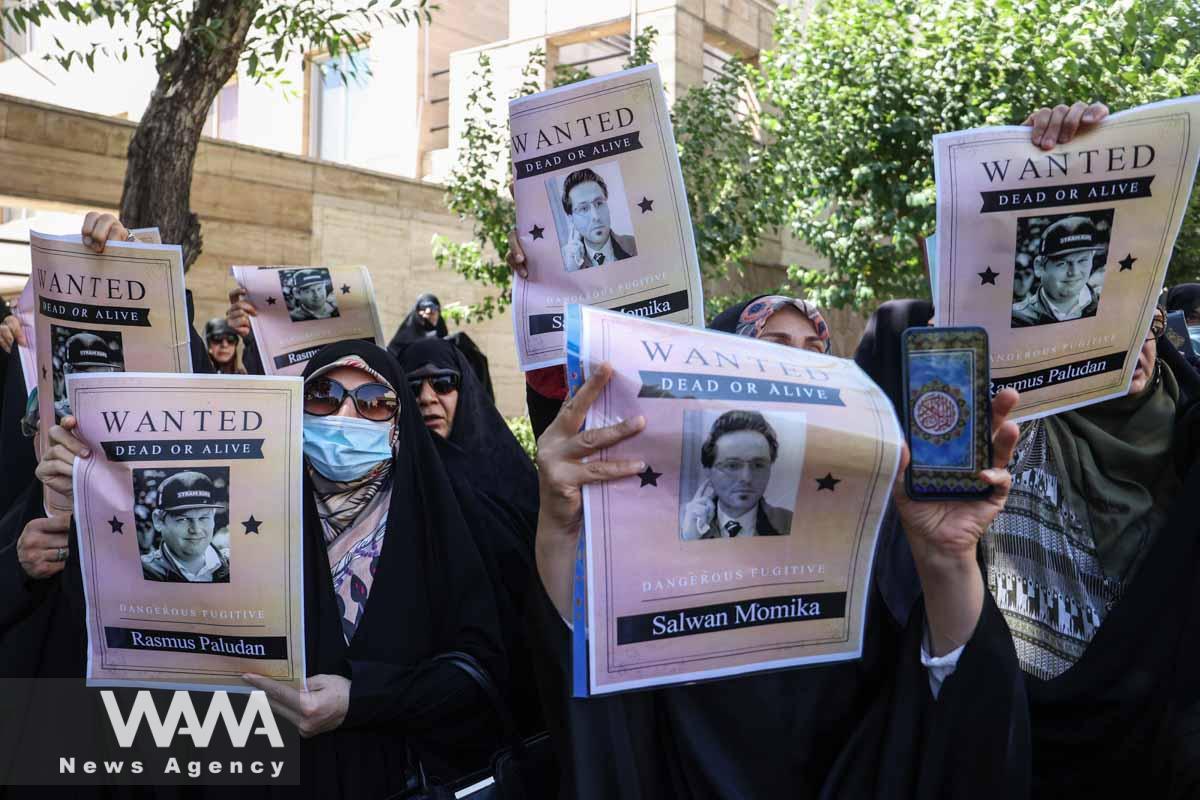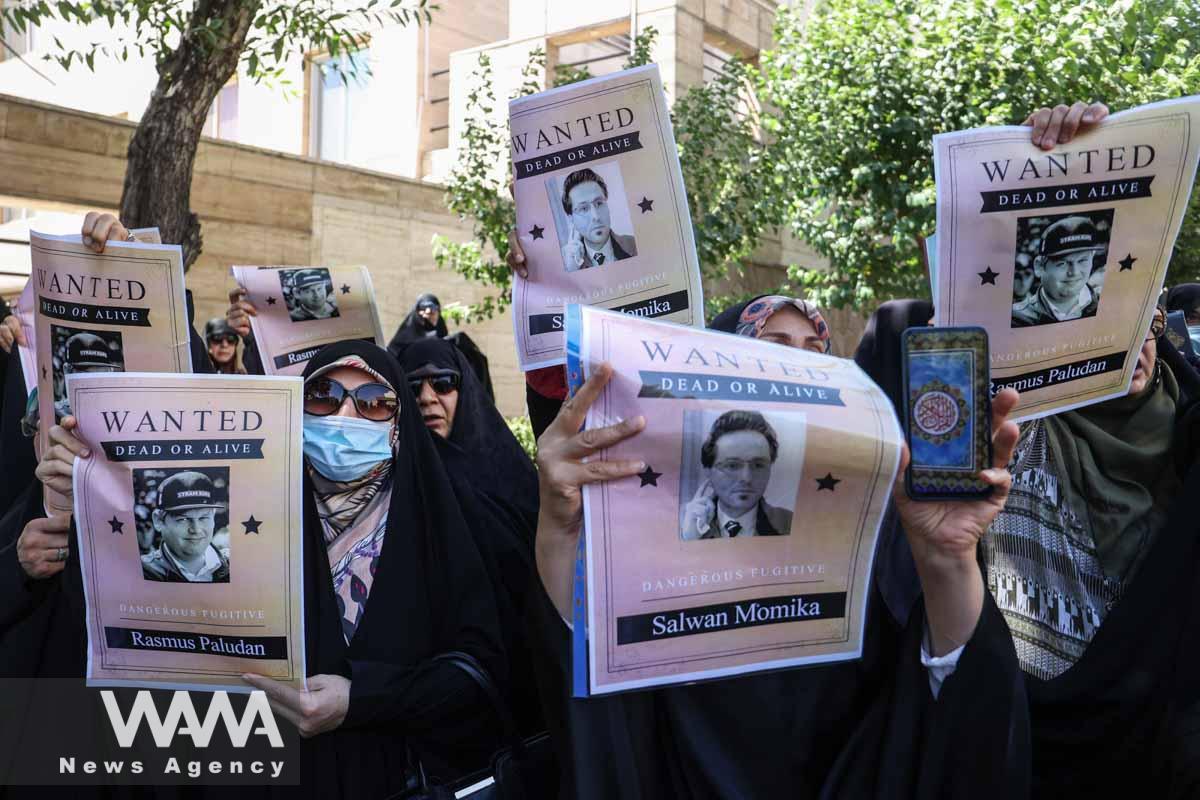Fire in Cyberspace: Sweden Accuses Iran of a Cyber Attack
WANA (Sep 25) – In September 2024, the Swedish government accused Iran of carrying out a provocative cyberattack. This accusation followed the Quran-burning incidents of summer 2023, which sparked intense reactions across the Muslim world. However, this time the battle has moved to the digital realm. Sweden claims that Iranian-affiliated hackers sent a widespread inflammatory message, directly calling for violence and retaliation.
Sweden has alleged that technical evidence points to hacker groups linked to Iran. It also stated that the attack, which spread these provocative messages across the internet, was intentionally connected to the Quran-burning events and aimed at escalating tensions in the Middle East.

Consequences of Burning the Quran in Stockholm
WANA (Jul 1) – On Wednesday, a 37-year-old man stood outside the Swedish capital’s central mosque and tore out and torched pages from a copy of the holy Qur’an as Muslims celebrated the Eid al-Adha holiday. The man, who identified himself as an Iraqi refugee, burned the holy book following the go-ahead given by […]
But the key question remains: Does Sweden have solid, irrefutable evidence for this accusation? So far, the technical details provided by the Swedish government only point to “similar patterns” to previous attacks attributed to Iranian-linked groups. Some early reports from Sweden’s digital security think tank suggest that the methods used in the attack resemble past cyberattacks blamed on Iran, but no conclusive technical evidence has been presented yet.
Is this accusation merely a political move, or does it signal the emergence of a new phase in cyber warfare, driven by religious and ideological motives?
Iran has rejected the allegations, calling the Swedish prosecutor’s claims about sending inflammatory messages to Swedish citizens baseless. The Iranian embassy in Sweden issued a statement saying: “We expect official Swedish institutions to refrain from making unfounded accusations against the Islamic Republic of Iran. While those who insulted the Quran are being prosecuted, this issue should not be sidelined.”

Demonstrators take part in a protest, against a man who burned a copy of the Quran outside a mosque in the Swedish capital Stockholm, in front of the Swedish Embassy in Tehran, Iran June 30, 2023. Majid Asgaripour/WANA (West Asia News Agency)
Why is Sweden Targeting Iran?
Looking at the history of Iran’s relations with Western countries, especially in the digital space, it becomes clear that Iran has been recognized as one of the key players in cyber warfare. From cyberattacks on Israeli infrastructure to complex hacks attributed to Iran targeting Saudi Arabia and the United States.
But the important point is why Sweden, at this particular time, a year after the Quran-burning incidents, has concluded that Iran is responsible for these attacks. The answer may lie in the internal and international pressures facing the Swedish government. Widespread protests against Sweden’s freedom of speech policies and its failure to take firm action against Quran-burning have stirred public sentiment against the government, placing the country in a difficult position both at home and abroad.
At the same time, analysts close to the Iranian government see this accusation as part of the West’s efforts to increase diplomatic pressure on Tehran in the post-JCPOA era. These analysts point to a history of similar accusations used to weaken Iran’s position in international negotiations.

Iran’s AI-Powered Advanced Platform Tackles Cyber Threats Fast
WANA (Aug 22) – Researchers at Sharif University of Technology in Iran, with support from the Connectivity and Communications Development Headquarters, have created an AI-driven system designed to enhance the security of communication networks. According to Siawash Ahmadi, a faculty member at the university, this system, called SOAR (Security Orchestration, Automation, and Response), can […]
Cyberspace as an Ideological Battlefield
What sets this accusation apart is its ideological nature. Cyberattacks, which are usually aimed at gathering intelligence or damaging digital infrastructure, have now become tools for inflaming religious and cultural tensions. Given the sensitivities surrounding the Quran-burning and the widespread reactions in the Muslim world, this attack—whether directly orchestrated by the Iranian government or not—appears to exploit this cultural crisis.
Although Sweden’s accusation against Iran has been made without presenting sufficient evidence, it reflects a broader trend in today’s world. In an atmosphere where religious and cultural tensions are at their peak, cyberspace has become a tool for controlling and influencing these tensions.
Whether true or not, this accusation marks a shift in international politics and how states confront one another. In the end, this incident may be just one of many examples we will witness in the future. Cyber wars, intertwined with cultural and religious issues, could become an inseparable part of global developments in the coming decades.

Israel’s Terrorist Attack on Hezbollah in Lebanon
WANA (Sep 17) – Reports indicate simultaneous explosions in Hezbollah’s communication devices, including pagers, mobile phones, and radios, in areas of southern Lebanon, the southern suburbs of Beirut, and eastern Lebanon. These explosions have so far resulted in over 2,750 injuries and eight deaths, including a child, and the toll is still rising. International […]
It hasn’t been long since Israel’s terrorist attack on Lebanon, where thousands of electronic devices in people’s hands, pockets, and bags exploded, sparking fear worldwide.
Perhaps these same concerns prompted Antonio Guterres, the Secretary-General of the United Nations, to state in his recent speech that while advancements in AI technologies can help us in many fields, they are currently bringing us closer to conflict rather than freedom.













